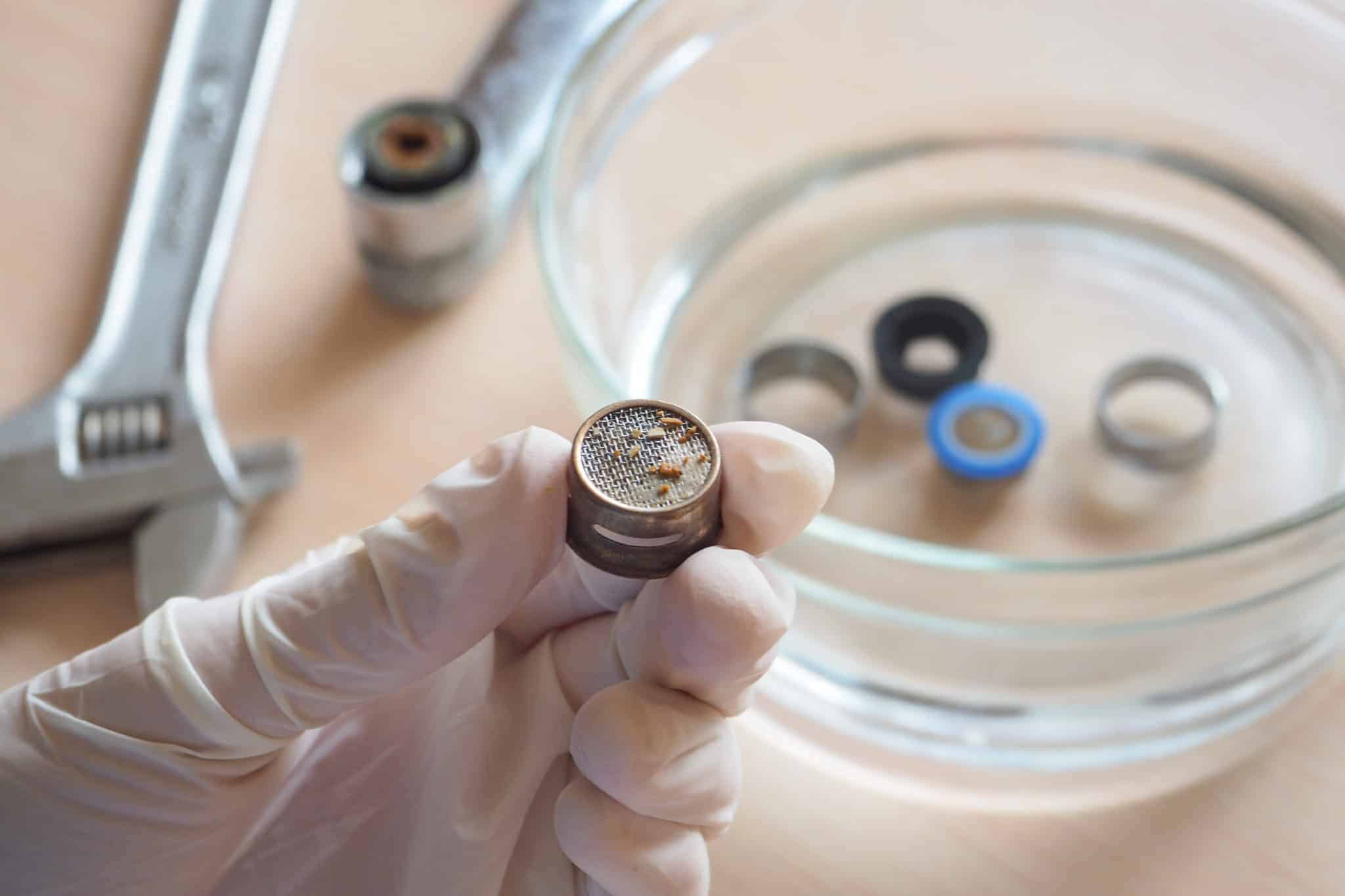“How Do I Read a Water Hardness Scale?” Lisa in Folsom, CA Asks a Plumbing Expert
 Our area has what’s known as hard water, so it’s no surprise that folks around here might be a little curious about what that means for them, just like our friend Lisa out in Folsom. Lisa asks:
Our area has what’s known as hard water, so it’s no surprise that folks around here might be a little curious about what that means for them, just like our friend Lisa out in Folsom. Lisa asks:
“Hi there, Bell Brothers! I’ve been living in Folsom for a few years now, and ever since I moved out here I’ve noticed that there are these little spots on my dishes and glasses that show up—even when they’re clean. I recently found out that this is because of hard water, which isn’t something that I haven’t had to deal with in the other places that I’ve lived. I’ve read your other posts, so I know that over a long enough period of time, hard water can damage your pipes, and, if I’m being honest, more importantly, your skin and hair.
So, how can I measure the quality of my water? And, once I’ve done that, how do I read a water hardness scale? I know that the exact severity of hard water can vary from house to house based on what part of Northern California you live in, so I’m trying to get a read on the status of the water at my home (and specifically whether I should be worried). I thought I’d bring these questions straight to the expert plumbers. Thank you so much in advance for your valuable time!” – Lisa in Folsom, CA
If only I had a nickel for every time a homeowner in our area has asked me a question about hard water! I’m happy to answer your question, Lisa. Hopefully, some of your neighbors in nearby cities will be able to benefit, too. With no further adieu, let’s get into what hard water is, how to read a water hardness scale—and why the heck hard water matters anyway.
What Is Hard Water (and Does Northern California Have It)?
I’ve talked in the past about the Sacramento region’s hard water, but I think it’s well worth going over here again. Hard water has a higher mineral content than most tap water because it has percolated through deposits of limestone and chalk, materials made up of calcium and magnesium carbonates. It’s not a health risk or anything serious like that, but some homeowners find hard water annoying because it can cause buildup on fixtures, as well as poor soap or laundry detergent performance.
 For many years, some of our Northern California communities, like Folsom where Lisa lives, have had hard water because their towns draw their supply from groundwater rather than a river. Groundwater is almost always higher in minerals. But just because you have hard water doesn’t always mean it’s a big deal, though, as we’ll talk about below.
For many years, some of our Northern California communities, like Folsom where Lisa lives, have had hard water because their towns draw their supply from groundwater rather than a river. Groundwater is almost always higher in minerals. But just because you have hard water doesn’t always mean it’s a big deal, though, as we’ll talk about below.
How to Read a Water Hardness Scale
Water hardness can be measured pretty easily by using a soft water test kit, which will measure grains of hardness. There are multiple types of these kits available, all of which you can find pretty easily online. One type works by using a test tablet, another by wetting a paper strip, and still a third by filling a test bottle with a specified amount of water from your tap.
Usually, regardless of what kit you use, there’s a color change component involved. But, just follow the directions for your unique kit and it should be easy enough to arrive at the number of grains in your water between 0 and 59. Then, read the scale.
Here is the water hardness scale, measured in grains per gallon:
- 0 -1 grains is very soft water.
- 1 – 3.5 grains is slightly hard water.
- 3.5 – 7.0 grains is medium hard water.
- 7.0 – 10.5 grains is hard water.
- 10.5 and higher grains is very hard water.
Generally, anything over 5.0 grains per gallon is what we might deem as hard water…
Generally, anything over 5.0 grains per gallon is what we might deem as hard water that can, over a long enough period of time, cause problems with your plumbing. Or, as Lisa was most concerned about, your hair and your kin.
Why Does the Hard Water Scale Matter?
As Lisa is well aware of, hard water is pretty easy to identify because it tends to leave little spots on your glasses and plates. If that was all it did, though, we could probably skip this section—and maybe this whole post altogether. Sure, those little spots are harmless enough, but living in a home that has hard water circulating into it for many, many years can start to cause problems for your pipes and plumbing.
The simple truth about hard waters is that it’s not really that hard to measure or deal with. As I noted above, you can buy a kit to confirm your hard water concerns via Amazon. The next step, once you know you have hard water, is to simply to call out a plumbing professional to advise you from there.
As a side note, I’m always a big fan of getting a home plumbing inspection whenever you buy a new home, as any plumber worth his or her salt will be able to tell you if you have hard water—and suggest solutions right then and there. As a side side note, I also recommend working with a trained plumber on this hard water thing because they can talk to you about getting a tankless water heater in your home, which can reduce the amount of water you use and ultimately save you money on your utility bills.
There may be hard water in this region, but we also have home energy efficiency financing options that are designed to make it easier for you invest in upgrades that help you save on your water bill while softening your water.
Contact the plumbing professionals at Bell Brothers to learn more about hard water, whether or not you have it in your home, and what you can do to ensure that it has a minimal effect on your plumbing. Here at Bell Brothers, we can also offer recommendations that are sure to increase your year-round water efficiency—and decrease your water bills.
Wondering how to finance a new HVAC system, windows, or plumbing project? HERO is a unique financing option that helps California homeowners afford energy efficient upgrades to their home. Contact Bell Brothers, a HERO-approved contractor, to learn more. Our local HVAC, plumbing, and window specialists will walk you through the entire process, from applications to installation.
Image courtesy Stanislav71

